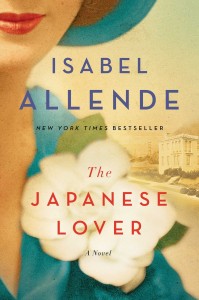JQ Magazine: Book Review — ‘The Japanese Lover’

“The Japanese Lover has its ups and downs, but it does serve as an eventful tour of various aspects of 20th century history.” (Atria Books)
By Rashaad Jorden (Yamagata-ken, 2008-10) for JQ magazine. A former head of the JETAA Philadelphia Sub-Chapter, Rashaad is a graduate of Leeds Beckett University with a master’s degree in responsible tourism management. For more on his life abroad and enthusiasm for taiko drumming, visit his blog at www.gettingpounded.wordpress.com.
We might be keeping fascinating mementos from our daily lives that if discovered, might stun many people.
Certainly, letters documenting something shocking (well, shocking during a certain period of history) would classify as that. Isabel Allende’s The Japanese Lover highlights one woman’s relationship with a Japanese national during her eventful life.
The story’s protagonist is Alma Belasco, a native of Eastern Europe was sent to live with well-to-do relatives in San Francisco when she was young. During the latter years of Alma’s life, she lives with a caretaker named Irina Bazili, who learns about an important figure who shaped Alma’s life and is described in the title of the book: a man named Ichimei Fukuda. Ichimei could also be described as a secret lover because the two had to keep their romance on the down low as it occurred during the height of World War II when people of Japanese descent were considered a threat to American society. The Japanese Lover also takes a journey not only through Alma’s life, but Irina’s as well as Ichimei’s.
Those attracted to the book by its title may be disappointed by the fact none of the scenes actually take place in Japan, although Allende mentions that Alma had traveled to the country a number of times and was planning to return to Kyoto. However, the reader gets an excellent picture of the experiences of many Japanese Americans around the time of World War II. For example, in 1942, people of Japanese descent in San Francisco were subject to a nighttime curfew from 8 p.m. to 6 a.m., and couldn’t go outside of a radius of five miles from their homes without special permission. The Fukuda family was also detained in an internment camp and was prohibited from speaking Japanese.
As expected, much of The Japanese Lover is devoted to Alma’s relationship with Ichimei and the struggles faced by the Fukuda family. Of course, the difficulties that Alma and Ichimei faced are mentioned—their correspondence was heavily censored when Ichimei was detained in an internment camp in Arizona. But a surprise is later revealed when the Fukuda and Belasco families actually have a strong relationship, as Alma’s cousin Isaac sets up a partnership with Ichimei’s father Takao to establish a flower and decorative plant nursery.
While the novel certainly has its juicy moments (Interestingly enough, Ichimei and Alma’s romance is not the only interracial one appearing in The Japanese Lover—Ichimei’s sister Megumi has fallen in love with one of the few Caucasians to gain the respect of those detained in the internment camp), it feels like there are several different stories in one. Probably because the story is told by characters looking back in the past, important events told in The Japanese Lover don’t flow naturally.
The story seems to jump around various points in Alma’s life: from the Lark House retirement home (where Irina Bazili began working in 2010) in San Francisco to the Belascos’ life in Eastern Europe to the despair of the internment camp to meeting up in Paris with her brother, where she learns a lot about her family’s history during World War II. Interesting things happened during all of those periods, but with so many different characters appearing in A Japanese Lover, you don’t really get a diverse feel for their personalities.
The portions of the story devoted to Alma’s love life are the most interesting and shocking. Her relationship with Ichimei resulted in a pregnancy that forced her to make a life-changing decision. Although Alma did not marry him, she did continue to correspond with him—even when she eventually married a man named Nathaniel. Their marriage comes to an end in an unexpected manner.
The Japanese Lover has its ups and downs, but it does serve as an eventful tour of various aspects of 20th century history.
Read an excerpt from The Japanese Lover here.
For more JQ magazine book reviews, click here.


Comments are closed.